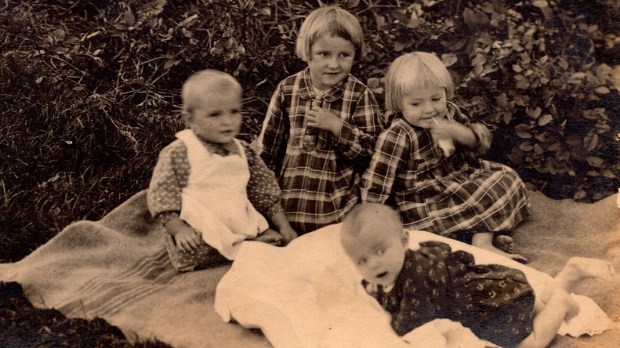On December 17, 2022, Pope Francis authorized 16 decrees of the Dicastery for the Causes of Saints. Among them are two particularly well-known cases: That of a Polish couple and their seven children, murdered by the Nazis, and that of Matteo Ricci, the great Jesuit missionary to China.
Józef and Wiktoria, and their 7 children, ages 8 to unborn
Jozef and Wiktoria Ulma and their seven children were murdered by the Nazis on March 24, 1944, in Markowa, Poland, for having sheltered Jews during the Second World War.
The Catholic Church officially recognizes their death as “in hatred of the faith.”
On March 24, 1944, the German police entered their home, killed the eight Jews who had taken refuge there, and then shot the couple. The German soldiers then turned their attention to the children, whom they also shot: eight-year-old Stanislas, six-year-old Barbara, five-year-old Władysław, four-year-old Franciszek, three-year-old Antoni, and one-year-old Maria. The couple was expecting a seventh child, also recognized as a martyr by the Church today.
In the region, this family was nicknamed “The Samaritans of Markowa.”
Jozef and Wiktoria Ulma were recognized in 1995 as “Righteous Among the Nations.” According to the Yad Vashem memorial, this massacre of the Ulma family “became a symbol of Polish sacrifice and martyrdom during the German occupation.
Learn more about them here:
Father Ricci
Father Matteo Ricci (1552-1610), a great Jesuit missionary in China, was recognized as living heroic virtue, and thus becomes venerable.
In the tense context of relations between China and the Holy See, the recognition of the heroic virtues of the Jesuit priest is particularly strong news that comes almost 40 years after the opening of his cause.
This Italian, born in Macerata, entered the Society of Jesus at the age of 18. In 1577, he asked permission to leave for the Oriental missions and went to India where he was ordained a priest in Goa. In 1583, he entered China – usually impenetrable to foreigners – and settled in the southeast of the empire near Canton where he lived for 17 years. He was the first religious to enter the court of the Emperor of China, in 1600.
There, he implemented a new method of apostolate that consisted of adapting to the customs and habits of the country and taking care of the formation of an indigenous clergy. Passionate about physics, astronomy, mathematics and music, he published many scientific and religious works in Chinese, works that were welcomed by the Chinese high society. He was also the author of maps that presented the world to China. After 28 years of mission, he died in Beijing in 1610, at the age of 57.
He is considered an apostle of inculturation and the precursor of the great lineage of Jesuits in China. It was only in 1984 that the bishop of Macerata, the city of his birth, launched his cause of beatification. This cause is associated with that of his scholar friend Xu Guangqi, a high official at the imperial court, who converted to Christianity and took the name of Paul.
Bishop Jacinto Vero (1813-1881), Blessed of Uruguay
A miracle attributed to the intercession of Bishop Jacinto Vero (1813-1881) was also recognized by a decree issued by the dicastery. The first bishop of Montevideo will thus become blessed.
He carried out his mission with pastoral zeal during the complex times of independence of South American countries. In this difficult socio-political context, while he demanded religious freedom and the rights of the Church and the poor, he was forced into exile for a time.
In 1867, he had traveled to Europe in search of missionaries for his country and had also participated in the First Vatican Council in 1870. His cause was opened in 1935 and Pope Francis recognized him as venerable in 2015.
Brazilian layman Franz de Castro Holzwarth
Born in 1942 in the state of Rio de Janeiro, Franz de Castro Holzwarth became a lawyer. It was through contact with prisoners that he found his vocation, joining in 1973 an association that helps convicted people. With the prisoners, Franz de Castro Holzwarth got into the habit of praying and offering spiritual guidance.
When he was only 38 years old, he was called to mediate in a prison where a rebellion had broken out. He offered to take the place of one of the police officers who was being held hostage. The mediation ended badly and the young man died in the process.
The Church now officially recognizes the “offering of life” of this Brazilian.
Other new venerables
Other recognitions: The heroic virtues of Italian priest Ugo De Biasi (1918-1982), Polish priest Alexander Woźny (1910-1983), and his compatriot, Father Ignazio Pasadzy (1898-1984), co-founder of the Society of Christ for Polish emigrants and founder of the Congregation of Missionary Sisters of Christ the King for Polish emigrants.
Also among the decrees promulgated is the now venerable Martin Benedict, a professed priest of the Order of Friars Minor Conventual, who died in Romania in 1986. Born in 1931, this Franciscan doctor hid his identity as a priest for nearly 20 years to escape the police of Ceaușescu’s communist regime. He celebrated Mass in his apartment and continued his service at the hospital, where the faithful nicknamed him, “the doctor who prays a lot.” Recognized as a priest by the police, he was persecuted by the regime and finally died in 1986. His canonization process began on April 14, 2007.
Also recognized was the heroic virtues of five women founders of religious communities: Mother Miradio of the Providence of St. Gaetan, founder of the Congregation of the Poor Daughters of St. Anthony, now Franciscan Sisters of St. Anthony, who died in Naples in 1926; Maria Ignazia Isacchi, founder of the Congregation of the Ursuline Sisters of the Sacred Heart of Asola, who died in Seriate, Italy, in 1934; Margherita Crispi, foundress of the Congregation of the Oblate Sisters of Divine Love, who died in Rome in 1974; Margherita Maria Guaini, foundress of the Congregation of the Missionary Sisters of Jesus the Eternal Priest, who died in Varallo Sesia in 1994; and Maddalena Aulina Saurina, foundress of the Secular Institute of the Señoritas Operarias Parroquiales, who lived in Spain until the middle of last century.
Giuseppe Marco Figueroa, a professed religious of the Society of Jesus, born in the second half of the 19th century in Sapgna and who died in Argentina in the 1940s, has also had his heroic virtue recognized, as has the Italian nun Teresa Veronesi, a professed member of the Congregation of the Minimal Sisters of Our Lady of Sorrows, who died in 1950.
In Zimbabwe
Finally, the consecrated laywoman Luisa Guidotti Mistrali, belonging to the Association of Women Missionaries of Medicine, is also now recognized as venerable. Born in 1932 in Parma, she left Italy in 1966 for Rhodesia (Zimbabwe) to serve in a hospital.
While the country was going through a wave of violence, she was arrested by the regime in 1976 for having treated an opponent. She was finally released, with the help of the Holy See and the Italian government, according to the Dicastery for the Causes of Saints. Three years later, when she had just taken a woman in an ambulance who was about to give birth, she was probably hit by a burst of machine-gun fire on a road held by the government army and died in these troubled circumstances.




